Achromatopsia Study guides, Class notes & Summaries
Looking for the best study guides, study notes and summaries about Achromatopsia? On this page you'll find 40 study documents about Achromatopsia.
Page 3 out of 40 results
Sort by
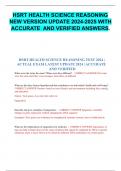
-
HSRT HEALTH SCIENCE REASONING NEW VERSION UPDATE 2024-2025 WITH ACCURATE AND VERIFIED ANSWERS.
- Exam (elaborations) • 8 pages • 2024
-
- $13.49
- + learn more
What are the three factors hypothesized that contribute to an individual's health and well-being? - CORRECT ANSWER Nurture- based on your lifestyle and environment including diet, rearing, and education Nature- Your genes, eye color, hair color etc Epigenetics Describe and give examples of epigenetics. - CORRECT ANSWER Epigentics- heritable changes in gene expression without changing the DNA sequence Examples- How genes are weakened or strengthened, immune systems, how to build muscle What...
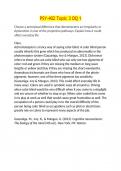
-
PSY-402 Topic 3 DQ 1
- Exam (elaborations) • 1 pages • 2024
-
Available in package deal
-
- $9.99
- + learn more
PSY-402 Topic 3 DQ 1 Choose a perceptual difference that demonstrates an irregularity or dysfunction in one of the projection pathways. Explain how it could affect everyday life Class, Achromatopsia is a fancy way of saying color blind. A color blind person usually inherits this gene which has produced an abnormality in the photoreceptor system (Gazzaniga, Ivry & Mangun, 2013). Dichromat refers to those who are color blind who can only see two pigments of color: red and green if they are mi...
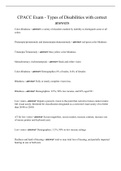
-
CPACC Exam - Types of Disabilities with correct answers
- Exam (elaborations) • 5 pages • 2023
- Available in package deal
-
- $7.99
- + learn more
Color-blindness - answer a variety of disorders marked by inability to distinguish some or all colors Protanopia/protanomaly and deuteranopia/deuteranomaly - answer red-green color blindness Tritanopia/Tritanomaly - answer blue-yellow color blindness Monochromacy (Achromatopsia) - answer black-and-white vision Color-blindness - answer Demographics 8% of males, 0.4% of females Blindness - answer Fully or nearly complete vision loss. Blindness - answer Demographics: 0.5%; 90% low...
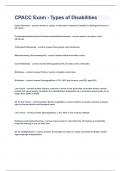
-
CPACC Exam - Types of Disabilities|2023 LATEST UPDATE|GUARANTEED SUCCESS
- Exam (elaborations) • 4 pages • 2023
-
Available in package deal
-
- $14.99
- + learn more
Color-blindness a variety of disorders marked by inability to distinguish some or all colors Protanopia/protanomaly and deuteranopia/deuteranomaly red-green color blindness 00:03 01:25 Tritanopia/Tritanomaly blue-yellow color blindness Monochromacy (Achromatopsia) black-and-white vision Color-blindness Demographics 8% of males, 0.4% of females Blindness Fully or nearly complete vision loss. Blindness Demographics: 0.5%; 90% low income, a...
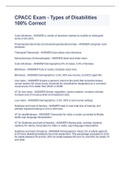
-
CPACC Exam - Types of Disabilities 100% Correct
- Exam (elaborations) • 4 pages • 2023
-
- $9.99
- + learn more
Color-blindness - ANSWER a variety of disorders marked by inability to distinguish some or all colors Protanopia/protanomaly and deuteranopia/deuteranomaly - ANSWER red-green color blindness Tritanopia/Tritanomaly - ANSWER blue-yellow color blindness Monochromacy (Achromatopsia) - ANSWER black-and-white vision Color-blindness - ANSWER Demographics 8% of males, 0.4% of females Blindness - ANSWER Fully or nearly complete vision loss. Blindness - ANSWER Demographics: 0.5%; 90% low...

-
NATS 1870 FINAL EXAM REVIEW
- Exam (elaborations) • 21 pages • 2024
-
Available in package deal
-
- $21.49
- + learn more
NATS 1870 FINAL EXAM REVIEW through accommodation, your eye can change its refractive power to help it focus images by changing the shape of the lens itself, via attached ciliary muscles contracting or relaxing it (lesson 13) we have blurry vision in water (such as in a swimming pool) because cornea itself is mostly made of water, reducing the difference in indices of refraction (lesson 13) a person born with no (functioning) retina in his eyes would be completely blind (lesson 13) alth...
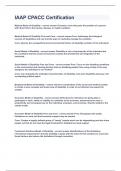
-
IAAP CPACC Certification|2023 LATEST UPDATE|GUARANTEED SUCCESS
- Exam (elaborations) • 27 pages • 2023
-
Available in package deal
-
- $13.99
- + learn more
Medical Model of Disability Presents a view that pairs the problem of a person with direct link to the trauma, disease, or health condition Medical Model of Disability Pros and Cons Pros: Addresses the biological sources of disabilities and can provide ways to medically manage the condition Cons: Ignores the sociopolitical and environmental factors of disability; problem of the individual 00:23 01:25 Social Model of Disability Disability is not a characteristic of the...
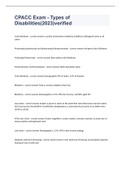
-
CPACC Exam - Types of Disabilities(2023)verified
- Exam (elaborations) • 5 pages • 2023
- Available in package deal
-
- $9.99
- + learn more
CPACC Exam - Types of Disabilities(2023)verified Color-blindness - correct answer a variety of disorders marked by inability to distinguish some or all colors Protanopia/protanomaly and deuteranopia/deuteranomaly - correct answer red-green color blindness Tritanopia/Tritanomaly - correct answer blue-yellow color blindness Monochromacy (Achromatopsia) - correct answer black-and-white vision Color-blindness - correct answer Demographics 8% of males, 0.4% of females Blindness - corre...
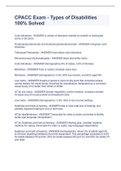
-
CPACC Exam - Types of Disabilities 100% Solved
- Exam (elaborations) • 4 pages • 2023
-
- $9.99
- + learn more
Color-blindness - ANSWER a variety of disorders marked by inability to distinguish some or all colors Protanopia/protanomaly and deuteranopia/deuteranomaly - ANSWER red-green color blindness Tritanopia/Tritanomaly - ANSWER blue-yellow color blindness Monochromacy (Achromatopsia) - ANSWER black-and-white vision Color-blindness - ANSWER Demographics 8% of males, 0.4% of females Blindness - ANSWER Fully or nearly complete vision loss. Blindness - ANSWER Demographics: 0.5%; 90% low...
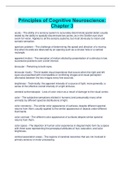
-
Principles of Cognitive Neuroscience: Chapter 3
- Exam (elaborations) • 4 pages • 2023
-
- $13.49
- + learn more
acuity - The ability of a sensory system to accurately discriminate spatial detail; usually tested by the ability to spatially discriminate two points, as in the Snellen eye chart exam for vision. Applies to all the sensory systems, but most obviously to vision and somatic sensation. aperture problem - The challenge of determining the speed and direction of a moving line when its ends are obscured by an opening such as a circular hole or a vertical rectangle. apparent motion - The se...

$6.50 for your textbook summary multiplied by 100 fellow students... Do the math: that's a lot of money! Don't be a thief of your own wallet and start uploading yours now. Discover all about earning on Stuvia


